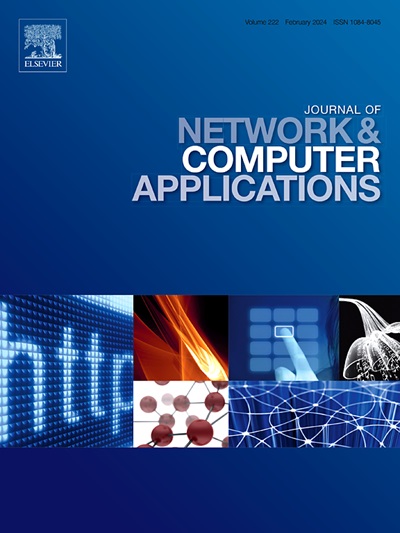FRRL: A reinforcement learning approach for link failure recovery in a hybrid SDN
IF 7.7
2区 计算机科学
Q1 COMPUTER SCIENCE, HARDWARE & ARCHITECTURE
引用次数: 0
Abstract
Network failures, especially link failures, happen frequently in Internet Service Provider (ISP) networks. When link failures occur, the routing policies need to be re-computed and failure recovery usually takes a few minutes, which degrades the network performance to a great extent. Therefore, a proper failure recovery scheme that can realize a fast and timely routing policy computation needs to be designed. In this paper, we propose FRRL, a Reinforcement Learning (RL) approach to intelligently perceive network failures and timely compute the routing policy for improving the network performance when link failure happens. Specifically, to perceive the link failures, we design a Topology Difference Vector (TDV) encoder module in FRRL for encoding the topology structure with link failures. To efficiently compute the routing policy when link failures happen, we integrate the TDV in the agent training for learning the map between the encoded failure topology structure and routing policies. To evaluate the performance of our proposed method, we conduct experiments on three network topologies and the experimental results demonstrate that our proposed method has superior performance when link failures happen compared to other methods.
FRRL:混合 SDN 中链路故障恢复的强化学习方法
在互联网服务提供商(ISP)网络中,网络故障,尤其是链路故障经常发生。当链路故障发生时,路由策略需要重新计算,故障恢复通常需要几分钟的时间,这在很大程度上降低了网络性能。因此,需要设计一种合适的故障恢复方案,以实现快速、及时的路由策略计算。本文提出的 FRRL 是一种强化学习(RL)方法,它能智能地感知网络故障,并在链路故障发生时及时计算路由策略以提高网络性能。具体来说,为了感知链路故障,我们在 FRRL 中设计了拓扑差异向量(TDV)编码器模块,用于对链路故障拓扑结构进行编码。为了在链路故障发生时高效计算路由策略,我们将 TDV 集成到代理训练中,以学习编码故障拓扑结构与路由策略之间的映射。为了评估我们提出的方法的性能,我们在三种网络拓扑结构上进行了实验,实验结果表明,与其他方法相比,我们提出的方法在发生链路故障时具有更优越的性能。
本文章由计算机程序翻译,如有差异,请以英文原文为准。
求助全文
约1分钟内获得全文
求助全文
来源期刊

Journal of Network and Computer Applications
工程技术-计算机:跨学科应用
CiteScore
21.50
自引率
3.40%
发文量
142
审稿时长
37 days
期刊介绍:
The Journal of Network and Computer Applications welcomes research contributions, surveys, and notes in all areas relating to computer networks and applications thereof. Sample topics include new design techniques, interesting or novel applications, components or standards; computer networks with tools such as WWW; emerging standards for internet protocols; Wireless networks; Mobile Computing; emerging computing models such as cloud computing, grid computing; applications of networked systems for remote collaboration and telemedicine, etc. The journal is abstracted and indexed in Scopus, Engineering Index, Web of Science, Science Citation Index Expanded and INSPEC.
 求助内容:
求助内容: 应助结果提醒方式:
应助结果提醒方式:


